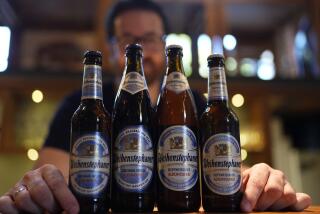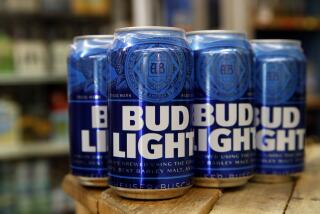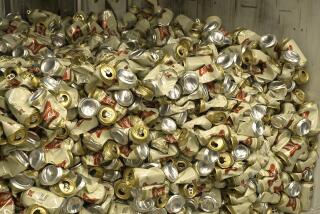Transatlantic Fight Brewing Over Right to Budweiser Name
- Share via
LONDON — Across Europe, beer connoisseurs are raising their glasses to a novel little brew called Budweiser that is building a reputation as one of the world’s finest lagers.
Although best known in its own country, the beer is making significant headway in export markets, and the company is developing plans to make it as popular abroad as it is at home.
Home, in this case, being Czechoslovakia.
There, in the Bohemian town of Ceske Budejovice--or Budweis, as it was known from the 13th Century until 1919--a modest-size brewery has spent the past hundred years producing Budweiser. The Czech brand is a descendant of a brewing tradition dating to medieval times, when all the locally produced beers were known as Budweiser, meaning “from Budweis.”
Newly untethered from a communist government that had siphoned off its earnings, the Czech Budweiser brewery is eager to modernize, increase production and broaden its world presence.
This does not please Anheuser-Busch Inc. of St. Louis, brewers of a totally unrelated beer that goes by the same name.
Trademark registration problems have impeded Anheuser-Busch’s efforts to market U.S. Budweiser in Europe. In a number of countries--including Spain, Italy and France--Anheuser-Busch is prohibited from calling “the king of beers” by its full name because the Czechs got there first. It’s simply “Bud.” And it isn’t sold at all in the beer-swilling nations of Germany and Austria.
Sensing an opportunity when the Velvet Revolution brought capitalism to Czechoslovakia, Anheuser-Busch executives quietly traveled to Ceske Budejovice and offered to buy out the brewery there.
What followed was an international brouhaha that pitted Czechoslovak national pride and European beer lovers against American financial muscle.
A full takeover by Anheuser-Busch now seems unlikely--having been thwarted, at least partly, by efforts of the influential British organization Campaign for Real Ale (CAMRA), which is part of the European Beer Consumers Union.
When word leaked out last year that the two breweries were holding talks, CAMRA dashed off an open letter to Czechoslovak President Vaclav Havel, imploring him to stop the sale.
Calling the Czech Budweiser “one of the finest examples of its style in the world” and the American Bud “clearly inferior in taste,” CAMRA told Havel:
“We believe Anheuser-Busch’s motives in seeking the Czech brewery are to gain complete control over the name, to exclude the Czech product from the rest of Europe and to appropriate the heritage of Ceske Budejovice for their own purposes.”
CAMRA pointed out that the beer made in the Budweiser Budvar brewery (Budvar is a Czech contraction for Budejovice Brewery ) is left to mature for three months. It contains only ingredients that adhere to Germany’s strict Pure Beer Law, the Rheinheitsgebot.
By comparison, U.S. Bud is matured for three weeks and contains rice as well as malt, preventing it from meeting the renowned German beer standards.
The letter made front page headlines in Czechoslovakia and was reported elsewhere in Europe. Czech pride and American imperialism became issues.
“All of a sudden, the government in Czechoslovakia realized they might lose the brand,” says a source connected with the Budvar brewery, who asked not to be identified.
Anheuser-Busch executives in the United States and Great Britain, where the firm’s European operations are headquartered, declined to discuss the company’s interest in Budweiser Budvar.
They have issued a press release that says they are “engaged in friendly and encouraging negotiations with representatives of the Budejovice Budvar brewery to settle our longstanding differences regarding the Budweiser trademark and other potential business collaborations.”
Whether the Czechoslovak government was about to sell the Budweiser Budvar brewery outright to Anheuser-Busch is a matter of some debate; according to some reports, the Americans offered $25 million for the Czech brewery at one stage. But officials now say they will not allow any foreign company to buy a majority share of the company or to alter the brewing process.
“I believe the (Budvar) brewery doesn’t want any foreign investment,” says Milan Glozar, counselor of the Czechoslovak Embassy in Great Britain. “But certainly they are desperate to modernize and produce more.”
The state-owned brewery is profitable and able to compete in Western markets without government subsidies, said Budvar’s brewmaster, Josef Tolar. He said the company also has significant sales throughout Eastern Europe.
Perhaps more than the Budweiser name dates back to Czechoslovakia. By some accounts, the brewers of Budweis were granted a charter to supply the royal court in 1265, resulting in the local product becoming known as the “beer of kings.”
But it was Adolphus Busch, the founder of Anheuser-Busch, who--in 1878--was the first to call a specific brand of beer “Budweiser.”
A company spokesman said that, like other late-19th-Century brewers who chose brand names from towns or regions “associated with Central Europe’s fine lager beers, Adolphus Busch ... coined the name Budweiser from the name of one such town in Bohemia, then known as Budweis.”
Today, the American Bud--with its 25% share of the U.S. market--is the most popular beer in the world, despite nearly inconsequential sales overseas. Budweiser Budvar produces about 300,000 barrels a year, or slightly more than what Anheuser-Busch makes in a day.
As part of its attempt build a European base, Anheuser-Busch filed a trademark action against Budweiser Budvar in Great Britain in the mid-1980s. But Anheuser-Busch lost the case.
And as a result, Great Britain is the only country in the world where both beers are sold under their full names. British liquor stores and supermarkets frequently display the two beers side by side.
More to Read
Sign up for Essential California
The most important California stories and recommendations in your inbox every morning.
You may occasionally receive promotional content from the Los Angeles Times.












